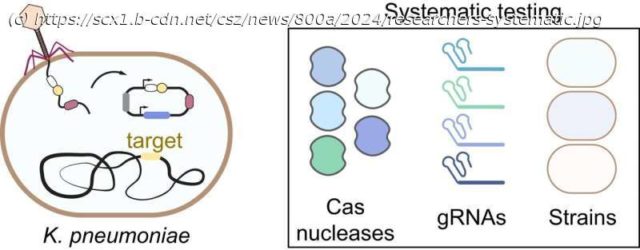The antimicrobial potential of CRISPR-Cas systems is promising, yet how to best design or implement CRISPR nucleases remains poorly understood. An international team led by the Helmholtz Institute for RNA-based Infection Research (HIRI) in Würzburg has now addressed this knowledge gap.
The antimicrobial potential of CRISPR-Cas systems is promising, yet how to best design or implement CRISPR nucleases remains poorly understood. An international team led by the Helmholtz Institute for RNA-based Infection Research (HIRI) in Würzburg has now addressed this knowledge gap.
The researchers have conducted the first systematic interrogation of CRISPR antimicrobials using multidrug-resistant and hypervirulent bacteria as case studies, revealing wide variations in efficacy that could be predicted via high-throughput screening and machine learning. Their findings are published in the journal Nucleic Acids Research.
The discovery of antimicrobial compounds such as conventional antibiotics has transformed medicine, allowing for the treatment of infections that were once deemed untreatable. However, the development pipeline for new agents has slowed, while the improper use of existing antibiotics has fueled the emergence of antibiotic resistance. Consequently, there is a growing need for new means to eradicate pathogens.
CRISPR-Cas systems, adaptive immune mechanisms bacteria employ to defend against viral invasion, offer a distinct solution through their capacity to selectively eliminate microbes based solely on genetic sequences. Yet to-date, systematic studies to assess the efficacy of these CRISPR antimicrobials–especially across different nucleases, target sites and bacterial strains–have been lacking.
Start
United States
USA — IT Researchers systematically investigate efficacy of CRISPR antimicrobial agents






